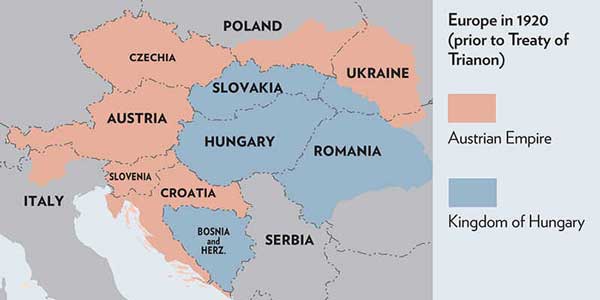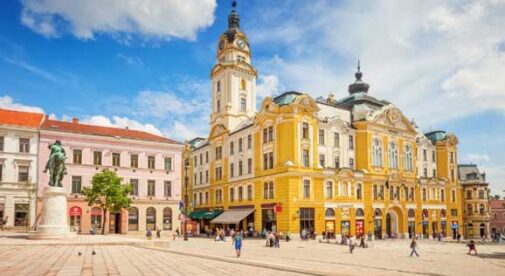The Treaty of Trianon. You’ve likely never heard of it. It happened in the summer of 1920, a year after the Treaty of Versailles, the summit that ended World War I. Trianon carved up the Hungarian Empire, the eastern half of what had been the Austro-Hungarian Empire. That cleavage left the new country of Hungary with about 7.6 million people, roughly two-thirds smaller than the population of 21 million Hungarians that existed before the war began.
And you are rightly thinking: Why do I care about a fact that might only ever be useful on an episode of Jeopardy?
I’ll take “European Citizenship for $1,000…”
I regularly write and speak about the ways to acquire citizenship in the European Union. After all, Europe tends to be the holy grail for lots of North Americans because of family heritage or because, once you’re a citizen of the E.U., you can live and work anywhere in the union without the hassles of visas and/or work permits.
One of the most popular ways for chasing European citizenship is through ancestry—proving a parent or grandparent was a citizen of a particular country, and using that as entrée to your own citizenship in, and passport from that country.
Most of the time, countries cut off the family tree at grandparent. A tiny few go back to great-grandparent. Italy goes so far as great-great-grandfather.
And then there’s Hungary.
The country quietly passed a citizenship law in 2011 that might just be the most generous citizenship-by-ancestry plan ever. If you can prove that anyone in your family tree was Hungarian, you can obtain Hungarian citizenship.
Which brings us back to the Treaty of Trianon.
Prior to that agreement, there were those 21 million citizens of the Hungarian Empire. Post-war, roughly 14 million of those ethnic Hungarians melted into what became the Balkan nations, as well as parts of modern-day Poland, Austria, Ukraine, Romania, Moldova, and Slovakia.
This is what the Empire looks like when superimposed atop modern Europe:

Everything in blue was the Hungarian Empire.
The orange, in case you’re wondering, is the Austrian Empire. Though the two were known as the Austro-Hungarian Empire, the reality was that you were either Austrian or Hungarian. (Note: This same citizenship-by-ancestry opportunity is available in Austria, whose empire began in 1804. Prove your relatives lived anywhere in the empire, including the Hungarian side, as well as modern day Czech Republic, or parts of Poland, Ukraine, Italy, Slovenia and Croatia, and you could be eligible for Austrian citizenship and an Austrian passport—which is also an E.U. passport.)
Given that the Hungarian Empire stretches back to about the year 1000 AD, you have the opportunity to scour nearly a millennium of family-tree lineage (1000 to 1920) to find ancestors who lived within the Empire’s borders. Find one, and you might very well have right to claim Hungarian heritage and, thus, be eligible for Hungarian citizenship and a Hungarian passport.
And that’s a strong passport to hold.

Get Your Free Report on Europe Here:
Learn more about countries in Europe and other countries from around the world in our daily postcard e-letter.
Simply enter your email address below and we'll also send you a FREE report - All the Charm and Romance of Europe…at a Price You Can Afford.
Hungary’s passport ranks fifth in the world, alongside passports from Singapore, Ireland, the UK, and Australia. It offers visa-free access to 110 countries. That’s actually slightly better than the U.S., which offers visa-free travel to 107 countries. (Austria, if you have opportunity to pursue that option, is the world’s #3 passport, offering visa-free travel to 114 countries.)
But there’s a bigger reason someone might want to own a Hungarian passport: Hungary is part of the European Union, which means that a Hungarian passport is an E.U. passport…which means that by holding a Hungarian passport, you have unfettered access to the entirety of the 27-member E.U. You can live and work anywhere you want within those member states—from Ireland to Greece, Portugal to Estonia.
It doesn’t matter when your ancestor lived in Hungary. So long as you can prove it, you have a path to Hungarian citizenship. Moreover, Hungary allows you to hold dual citizenship, meaning you don’t have to renounce your current citizenship to gain a Hungarian passport.
To be sure, that’s not necessarily an easy lift. Vital records prior to the 20th century are rare. Even those from the early 20th century can be challenge, in part because of the wars that have occurred, the countries that have been split apart and refashioned into new ones, and the records that have been destroyed in the transitions.
My wife is going through that now. She knows her ancestors come from western Ukraine, which would likely get her either Hungarian or Austrian citizenship. But tracking down 19th- and early 20th-century documents in Ukraine, which was once inside the Soviet Union, is a chore. People didn’t always want Soviet bureaucrats to know their family lineage, so lots of documents were destroyed by families themselves.
Find those documents, submit your application to a nearby Hungarian consulate (Washington, New York, Chicago, Los Angeles, Houston, and Miami; and in Toronto, Montreal, and Vancouver in Canada), then wait six to 12 months for the process to unfold.
During that time you might want to bone up on Hungarian history, the Constitution, and language because, yes, there is a test involved.
Luckily, there is a brochure available that you can read and memorize the answers to for the test on history and the Hungarian Constitution.
As for speaking the language, that will be a bit more of a hurdle. Hungarian is one of the most challenging languages in Europe for a native English speaker to learn. Thankfully, the language assessment is short and focused on basic, daily topics of interest, as well as information about your family. As such, rudimentary proficiency should probably be enough to get you past the finish line.
To be sure, this is not an impossible quest, despite the language necessity.
Through the end of 2019 (the last data I’ve seen), more than 1.1 million people had filed applications seeking Hungarian citizenship. More than 950,000 were approved. Most of those have come from countries surrounding Hungary, for obvious reasons; family lines over the decades have generally stayed in and around their home countries.
That said, people from as far away as the U.S., Canada, Australia, and Argentina have proven their Hungarian heritage and, thus, have gained Hungarian citizenship in recent years. So, it is doable.
Could I Live In Hungary? Could I Ever!
So what’s Hungary like?
Well, it’s one of the most picturesque countries in Europe. The capital of Budapest, straddling the Danube River, regularly rates among the 20 or so most-visited cities in the continent, and with good reason. It’s home to wide, elegant boulevards and 18th- and 19th-century architecture reminiscent of Paris—which is why Budapest is often referred to as the Paris of the East.
Life in Hungary as an expat is quite comfortable relative to the U.S. because the cost of living is so easy on a Western wallet. You can find two-bedroom, one-bathroom, 800-square-foot apartments, in the center of the city, with 12-foot ceilings and huge amounts of 18th-century character, all in a remodeled building, for under $1,000 per month.
Food is crazy cheap. A typical meal is under $10. A half-liter of beer (roughly 17 ounces) is about a buck-fifty. A good bottle of local, Hungarian wine is about $5 (and Hungarian wine is very good; often on par with a $30 to $40 bottle in the U.S.). A cappuccino at a local coffee shop—about $1.50.
And because Budapest is a walkable city with a good subway system, you can get around easily without the expense of a car and its associated costs and hassles.
Healthcare, meanwhile, is up to Western standards but is substantially cheaper, even for the private plans expats tend to buy. Premium health insurance plans are well under $100 per month, and that’s full coverage—no deductibles and co-pays, or paperwork rigamarole.
All in, you would need less than $2,500 a month to live a life similar to what would cost $4,100 per month in St. Louis…or $5,600 in Chicago…or $6,800 in Boston.
In short, Budapest is a major European capital priced as though it’s 4th-rate city in America. Frankly, it’s hard to find a comparison. Birmingham, Alabama; Pensacola, Florida; Reno, Nevada; Cheyenne, Wyoming…all are sharply more expensive than Budapest.
Which only serves to demonstrate just how affordable living in Hungary can be.
It might take some effort, but if you’ve been looking for an ancestral way into Europe, the Austro-Hungarian Empire might be a way to chase it. Maybe you’ve heard stories about family from the “old country” and you’ve always thought that they were Polish or Romanian or Slovakian. Just maybe, they were actually ethnic Hungarian before the Treaty of Trianon changed the Empire’s borders.
It’s certainly worth a bit of investigation.

Get Your Free Report on Europe Here:
Learn more about countries in Europe and other countries from around the world in our daily postcard e-letter.
Simply enter your email address below and we'll also send you a FREE report - All the Charm and Romance of Europe…at a Price You Can Afford.
Related Articles
Europe’s Top 5 Affordable Retirement Havens
The Best Towns and Cities to Retire in Europe
Planning Your Roving European Retirement
Upcoming Conferences
The Only 2024 Fast Track Panama Conference
If your dream retirement involves stunning beaches… lush green mountains… a warm climate with no hurricanes… first-rate healthcare… incredible value for money (a couple can live well on $2,200 a month)… and the World’s #1 Retiree Discount Program…
Join our Panama experts and expats in February and discover why Panama could be your perfect paradise.
REGISTER NOW, SEATS LIMITED: EARLY BIRD DISCOUNT HERE


.png)